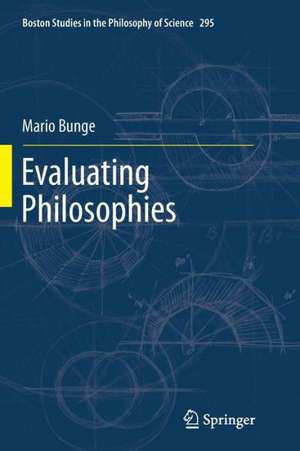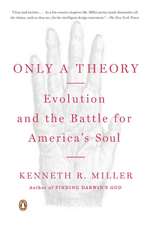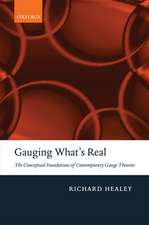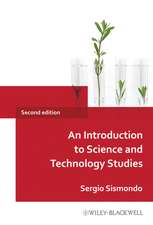Evaluating Philosophies: Boston Studies in the Philosophy and History of Science, cartea 295
Autor Mario Bungeen Limba Engleză Paperback – 9 aug 2014
| Toate formatele și edițiile | Preț | Express |
|---|---|---|
| Paperback (1) | 626.91 lei 38-44 zile | |
| SPRINGER NETHERLANDS – 9 aug 2014 | 626.91 lei 38-44 zile | |
| Hardback (1) | 727.18 lei 43-57 zile | |
| SPRINGER NETHERLANDS – 4 iul 2012 | 727.18 lei 43-57 zile |
Din seria Boston Studies in the Philosophy and History of Science
- 18%
 Preț: 944.19 lei
Preț: 944.19 lei - 15%
 Preț: 646.75 lei
Preț: 646.75 lei - 15%
 Preț: 646.75 lei
Preț: 646.75 lei - 15%
 Preț: 699.28 lei
Preț: 699.28 lei - 18%
 Preț: 736.50 lei
Preț: 736.50 lei -
 Preț: 500.02 lei
Preț: 500.02 lei - 15%
 Preț: 643.16 lei
Preț: 643.16 lei - 15%
 Preț: 650.69 lei
Preț: 650.69 lei - 15%
 Preț: 634.18 lei
Preț: 634.18 lei - 15%
 Preț: 642.68 lei
Preț: 642.68 lei -
 Preț: 391.40 lei
Preț: 391.40 lei -
 Preț: 383.33 lei
Preț: 383.33 lei - 18%
 Preț: 944.19 lei
Preț: 944.19 lei - 18%
 Preț: 955.56 lei
Preț: 955.56 lei - 15%
 Preț: 643.65 lei
Preț: 643.65 lei -
 Preț: 392.75 lei
Preț: 392.75 lei - 18%
 Preț: 1229.10 lei
Preț: 1229.10 lei - 18%
 Preț: 1238.23 lei
Preț: 1238.23 lei - 18%
 Preț: 951.29 lei
Preț: 951.29 lei - 18%
 Preț: 1223.25 lei
Preț: 1223.25 lei - 18%
 Preț: 1225.79 lei
Preț: 1225.79 lei - 18%
 Preț: 1226.42 lei
Preț: 1226.42 lei - 18%
 Preț: 1236.82 lei
Preț: 1236.82 lei - 15%
 Preț: 644.49 lei
Preț: 644.49 lei - 18%
 Preț: 1231.78 lei
Preț: 1231.78 lei - 15%
 Preț: 644.30 lei
Preț: 644.30 lei - 18%
 Preț: 957.62 lei
Preț: 957.62 lei - 18%
 Preț: 1222.49 lei
Preț: 1222.49 lei - 18%
 Preț: 947.50 lei
Preț: 947.50 lei - 18%
 Preț: 1833.95 lei
Preț: 1833.95 lei - 18%
 Preț: 1227.99 lei
Preț: 1227.99 lei - 18%
 Preț: 947.35 lei
Preț: 947.35 lei
Preț: 626.91 lei
Preț vechi: 824.89 lei
-24% Nou
Puncte Express: 940
Preț estimativ în valută:
119.100€ • 130.39$ • 100.86£
119.100€ • 130.39$ • 100.86£
Carte tipărită la comandă
Livrare economică 16-22 aprilie
Preluare comenzi: 021 569.72.76
Specificații
ISBN-13: 9789401780872
ISBN-10: 9401780870
Pagini: 216
Ilustrații: XIV, 202 p.
Dimensiuni: 155 x 235 x 11 mm
Greutate: 0.31 kg
Ediția:2012
Editura: SPRINGER NETHERLANDS
Colecția Springer
Seria Boston Studies in the Philosophy and History of Science
Locul publicării:Dordrecht, Netherlands
ISBN-10: 9401780870
Pagini: 216
Ilustrații: XIV, 202 p.
Dimensiuni: 155 x 235 x 11 mm
Greutate: 0.31 kg
Ediția:2012
Editura: SPRINGER NETHERLANDS
Colecția Springer
Seria Boston Studies in the Philosophy and History of Science
Locul publicării:Dordrecht, Netherlands
Public țintă
ResearchCuprins
Preface.- Introduction.- A. How to Nuture of Hinder Research.- 1 Philosophies and phobosophies.-2 The philosophical matrix of scientific progress.-3 Systemics and materalism.- B. Philosophy in Action.-4 Technoscience?.-5 Climate and logic.-6 Information Science: one or many?.-7 Wealth and wellbeing.-8 Can standard economic theory explain crises?.-9 Marxism: Promise and reality.-10 Rules of law: Just and unjust.- C Philosophical Gaps.- 11 Are subjective probabilities admissible? .-12 Can induction deliver high-level hypotheses? .- 13 Bridging theory to data.-14 Energy: physics or metaphysics? .- 15 Does quantum physics refute realism? .-16 Parallel universes? ¿Digital physics? .-17 Can functionalist psychology explain?.-18 Knowledge pyramids and rosettes.-19 Existence: one or two?.-20 Conclusion: Evaluation Criterion.- 21 Glossary.
Textul de pe ultima copertă
Philosophies, whether genuine or spurious, are not usually adopted because of their conceptual, empirical, or moral merits, but because of tradition, political interests, or even temperament–none of which is a good reason. The present book argues for a precise criterion: A philosophy is worth what it helps learn, act, conserve our common heritage, and get along with fellow humans.
Caracteristici
Proposes and illustrates a simple criterion for evaluating any philosophical doctrine: Does it help advance knowledge? Clearly written, and avoids the use of obscure technical terms Argues for an emergentist and non-reductionist view of materialism, as well as for a non-posivist version of scientism, and a systemic alternative to both individualism and holism. ?















